
The Immigrant is a 1917 American silent romantic comedy short. The film stars Charlie Chaplin's Tramp character as an immigrant coming to the United States who is accused of theft on the voyage across the Atlantic Ocean and falls in love with a beautiful young woman along the way. It also stars Edna Purviance and Eric Campbell.

The Essanay Film Manufacturing Company was an early American motion picture studio. The studio was founded in 1907 in Chicago, and later developed an additional film lot in Niles Canyon, California. Its various stars included Francis X. Bushman, Gloria Swanson and studio co-owner, actor and director, Broncho Billy Anderson. It is probably best known today for its series of Charlie Chaplin comedies from 1915-1916. In late 1916, it merged distribution with other studios and stopped issuing films in the fall of 1918. According to film historian Steve Massa, Essanay is one of the important early studios, with comedies as a particular strength. Its founders, George Kirke Spoor and Anderson, were subsequently awarded special Academy Awards for pioneering contributions to film.

Olga Edna Purviance(October 21, 1895 – January 13, 1958) was an American actress of the silent film era. She was the leading lady in many of Charlie Chaplin's early films and in a span of eight years, she appeared in over 30 films with him. Her name was pronounced "pur-VIE-unce" as verified by Chaplin in his spoken narration of one of his films.
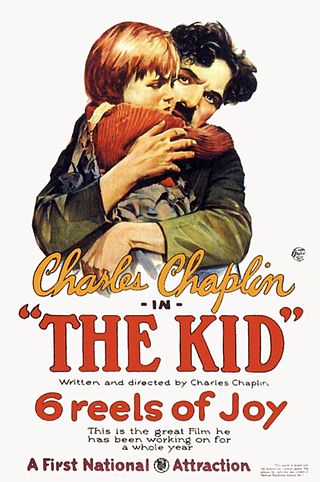
The Kid is a 1921 American silent comedy-drama film written, produced, directed by and starring Charlie Chaplin, and features Jackie Coogan as his foundling baby, adopted son and sidekick. This was Chaplin's first full-length film as a director. It was a huge success and was the second-highest-grossing film in 1921. Now considered one of the greatest films of the silent era, it was selected for preservation in the United States National Film Registry by the Library of Congress in 2011.

The Pawnshop was Charlie Chaplin's sixth film for Mutual Film Corporation. Released on October 2, 1916, it stars Chaplin in the role of assistant to the pawnshop owner, played by Henry Bergman. Edna Purviance plays the owner's daughter, while Albert Austin appears as an alarm clock owner who watches Chaplin in dismay as he dismantles the clock; the massive Eric Campbell's character attempts to rob the shop.

By the Sea is a 1915 American silent comedy film Charlie Chaplin made while waiting for a studio to work in Los Angeles. He had just left Niles Essanay Studio after doing five films at that location. By the Sea was filmed all on location in Santa Monica on the beach near Ocean Park Pier and on Crystal Pier in April 1915. The story centers on Charlie's Little Tramp character and how he gets into trouble trying to grab the attention of women on the beach. Edna Purviance plays one of the wives in whom he shows interest. It is said to be the first film to incorporate the classic gag of a man slipping on a banana skin.

A Jitney Elopement was Charlie Chaplin's fifth film for Essanay Films. It starred Chaplin and Edna Purviance as lovers, with Purviance wanting Chaplin to take her away from an arranged marriage her father had planned for her. Chaplin does take her away in a jitney, a type of share taxi popular in the US between 1914 and 1916. Most of the film was made in San Francisco and includes scenes of San Francisco's Golden Gate Park and the large windmills still on the park's west side.

Police is Charlie Chaplin's 14th film with Essanay Studios and was released in 1916. It was made at the Majestic Studio in Los Angeles. Charlie plays an ex-convict who finds life on the outside not to his liking and leads him to breaking into a home with another thief. Edna Purviance plays the girl living in the home who tries to change him.
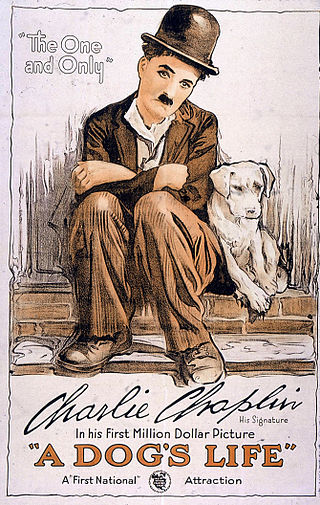
A Dog's Life is a 1918 American short silent film written, produced and directed by Charlie Chaplin. This was Chaplin's first film for First National Films. It was part of a then groundbreaking $1 million contract. It was for a total of eight 3 reel short silent films.
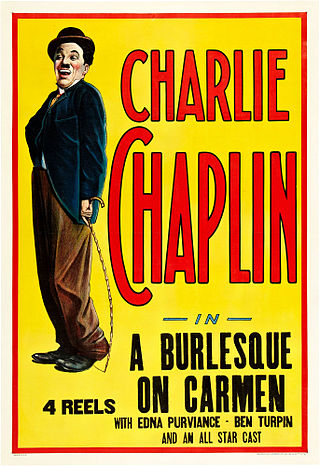
A Burlesque on Carmen is Charlie Chaplin's thirteenth film for Essanay Studios, originally released as Carmen on December 18, 1915. Chaplin played the leading man and Edna Purviance played Carmen. The film is a parody of Cecil B. DeMille's Carmen 1915, which was itself an interpretation of the popular novella Carmen by Prosper Mérimée.
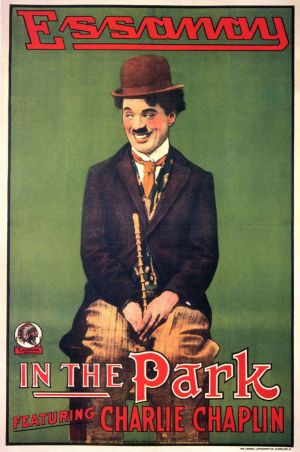
In the Park is Charlie Chaplin's fourth film released in 1915 by Essanay Films. It was his third film while at the Niles Essanay Studio. It was one of several films Charlie Chaplin created in a park setting. The film co-starred Edna Purviance, Leo White, Lloyd Bacon, and Bud Jamison.

The Vagabond is a 1916 American silent romantic comedy film by Charlie Chaplin and his third film with Mutual Films. Released to theaters on July 10, 1916, it co-starred Edna Purviance, Eric Campbell, Leo White and Lloyd Bacon. This film echoed Chaplin's work on The Tramp, with more drama and pathos mixed in with the comedy.

The Bank is a silent slapstick comedy. It was Charlie Chaplin's tenth film for Essanay Films.

The Idle Class is a 1921 American silent comedy film written and directed by Charlie Chaplin for First National Pictures.
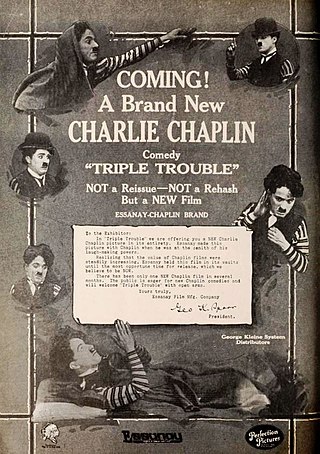
Triple Trouble is a two-reel American silent comedy film that was released in 1918. It stars Charlie Chaplin, Edna Purviance, and Leo White. This film was not an official Chaplin film, even though it has many Chaplin-directed scenes; after he left the studio, Essanay edited it together using outtakes and newly shot footage directed by Leo White. It had already been established in court that Chaplin had no legal control over the films made during his time with Essanay and could not prevent its release.

A Night Out is a 1915 Charlie Chaplin comedy short. It was Chaplin's first film with Edna Purviance, who would continue as his leading lady for the following eight years. It was also Chaplin's first film with Essanay Film Company in Niles, California. Chaplin's first Essanay film, His New Job, was made in the Chicago studio, after which he moved to Niles Studios. He found Purviance in San Francisco when he was searching for a leading lady for his films. A Night Out also stars Ben Turpin, Leo White and Bud Jamison.

The Champion is a 1915 American silent comedy film released by Essanay Studios, starring Charlie Chaplin alongside Edna Purviance and Leo White. Essanay co-owner and star, Broncho Billy Anderson can be seen as an enthusiastic audience member in the boxing match scene.

The Star Boarder is a 1914 American short comedy film starring Charlie Chaplin. The film is also known as The Landlady's Pet, its 1918 American reissue title.

Shanghaied is a 1915 American comedy silent film made by Essanay Studios starring Charlie Chaplin.
Ernest Van Pelt was an American actor. Van Pelt often starred in Charlie Chaplin films.




















